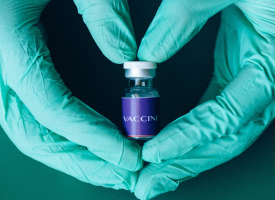Dr Omar Khorshid - Hotel quarantine; vaccine rollout
Transcript: AMA President, Dr Omar Khorshid, Sky News Live, First Edition with Peter Stefanovic, Thursday, 11 February 2021
Subject: Hotel quarantine; vaccine rollout
PETER STEFANOVIC: Health experts are calling for a higher grade in personal protective equipment for Victoria's hotel quarantine workers as the Holiday Inn cluster grows to eight. A quarantine worker and a traveller who finished their isolation tested positive yesterday. Health authorities are looking into a link between the outbreak and a traveller with the British strain of the virus who used a nebuliser. It's reported to have spread the virus by way of a fine mist, which can be breathed through N95 masks. The machines will be banned from quarantine hotels from Monday.
Let's get a little bit more on this now from Dr Omar Khorshid, President of the Australian Medical Association. Doctor, good to see you, thanks for joining us this morning. So, what's your thoughts on this nebuliser which may well be to blame here?
OMAR KHORSHID: Well, the problem isn't necessarily the nebuliser itself, it's just a way that the virus may have been pushed into the air. But it's actually our Government's lack of understanding that this virus does spread through the air in certain circumstances, not most of the time, but some of the time. And that's why we're seeing repeated breaches of our hotel quarantine arrangements all over the country. We didn't see nebulisers in those other outbreaks, but we still saw individual guards or other hotel quarantine workers contracting these new, more transmissible strains of the virus and then putting the rest of the communities at risk.
PETER STEFANOVIC: You know there had been, early on, there had been a lot of advice that suggested you could only really get it by spending upwards of about 15 minutes with someone. So now, is it just a whole lot less than that? You can get it from a little bit of mist?
OMAR KHORSHID: Well, we've always thought, some people, some scientists - and there has been a lot of disagreement on this particular point - but there's always been a recognition that in certain circumstances, the virus is much more transmissible. And this is the normal virus, the one that we've seen from the start. And hence we've seen these super spreader events in churches and restaurants and pubs and clubs and places where people are indoors, they're breathing the same air. We don't even know whether the index case had symptoms or not. But for some reason, they spread it through the air to a lot of people. So, in the right circumstances, it definitely does spread through the air. And you don't need to spend an extended period of time with a symptomatic person in order to catch this virus.
PETER STEFANOVIC: And vents, air conditioning vents, potentially?
OMAR KHORSHID: Well, not necessarily through the air conditioning. But if you haven't got your ventilation right, then the air can move from somebody who has the virus to then contaminate the air to where people are not adequately protected - so not through the actual air conditioning system itself, they do have filters in them and it's much less likely the virus would survive that, but certainly around a room or into the next room. And that's what we're seeing in these hotel quarantine places. You'd hope that the room in a quarantine facility will be under negative pressure, but in fact, probably these rooms are under positive pressure, pushing the virus out into the corridor and then contaminating the corridor and putting those guards at risk.
PETER STEFANOVIC: So this is why you're sticking with an argument now that all workers in hotel quarantine should be wearing PPE, similar to those staff in hospitals?
OMAR KHORSHID: Well, it's not even the case in hospitals yet. Victoria, that had the terrible experience with thousands of health care and aged care workers getting infected, now has proper protections in place for healthcare workers if they have another outbreak. But they don't have the same standards for the quarantine workers - and we don't understand that. It should be exactly the same for any worker exposed to this virus. And the rest of the country needs to get on board as well, and that means proper national guidelines. We've been calling for that for months and months, been promised it, but unfortunately, we're just not seeing it. And I think that that is actually putting the whole country at risk.
PETER STEFANOVIC: So all staff - just to paint a picture for me here - all stuff, whether it's guards, whether it's caterers, people dropping off food for those in hotel quarantine, should everybody be wearing PPE?
OMAR KHORSHID: That's right. Anyone who comes into any appreciable risk of contracting this virus. And I think most of the arrangements would already have people in masks and gloves and gowns with any significant contact with these people. But, in fact, we're saying airborne protection; that is respirator masks, proper eye protection that actually protects the workers. And also looking at the facilities to make sure your airflows are actually going to make the virus less likely to be pushed around the hotel, rather than more likely.
PETER STEFANOVIC: Just a couple of quick ones, Doctor, do you support South Australia's decision to lock out greater Melbourne, given those eight cases from the Holiday Inn?
OMAR KHORSHID: Look, it's very disappointing to see these interstate barriers being slammed down at every sign of the virus getting out. But I understand it, because our strategy is basically “keep the virus out of our communities” and the best way to do that if you're a State is to slam down your borders. But the real way we avoid this is actually to get that national consistency in all our arrangements, in what we do in the event of an outbreak. And in how we run our hotel quarantine and then maybe we won't need to be splitting ourselves apart from each other, every time one of these outbreaks happens.
PETER STEFANOVIC: Okay and also news breaking this morning out of the EU; the Pfizer jab is on its way to Australia.
OMAR KHORSHID: Look, that's great news and it's going to be an important step in improving the safety of our quarantine arrangements too. Because those quarantine workers will be at the top of the list. It's not going to stop the importance, though, of getting everything else right, because we do know that particularly the South African strain seems to be a problem for these vaccines. They're less effective than they are with the other strains. So, we've still got to get everything else right as these vaccines come into Australia and get put into the arms of the most vulnerable of our workforce and of our community.
PETER STEFANOVIC: What's your time estimates, Doctor, on how long it would take to vaccinate everybody in this country?
OMAR KHORSHID: Well, the Prime Minister's told us we have a target of October for the whole country, and obviously that depends on how many people are going to put their hands up. I'm pretty sceptical. I think that's a huge task. I think we heard at the Press Club just this week that that's 190,000 people a day. So, that's an awful lot of vaccination going on and it's just something we haven't had to do before. I think, though, we've just got to move through and learn as we go along. We've got to keep that positive message out there in the community - this is the way we protect our community. You've got to put your hand up and get the vaccine to do the right thing, to give us any chance of getting back to normality in the foreseeable future.
PETER STEFANOVIC: I mean, Sanjaya Senanayake, said yesterday in the Press Club that he believes that it won't be long until there's another pandemic. Are you in his corner on that one too?
OMAR KHORSHID: I think this pandemic is still going to be a problem for a while. We've got so many people around the world who are infected. That's a lot of mutation of the virus going on and that's why actually this vaccination program is so critical, because if we can get around the world, not just in Australia, if we can get the whole world vaccinated, you're going to have less of a pool of this virus being replicated again and again and again, and then changing, every time it changes, there's a risk that it'll become more of a problem for our community and create the next pandemic.
PETER STEFANOVIC: I mean, is there any way to measure how long?
OMAR KHORSHID: Look, I'm not an expert in that area. But it's been 100 years since the last big pandemic. I'd be surprised if it's another 100 years. We've got a much, much bigger population and a more mobile population around the world. So, let's get ready for the next one.
PETER STEFANOVIC: I don't know if you've managed to catch the NHS over in the UK. Just finally, Doctor, Michael Caine and Elton John have taken part in quite a clever and humorous ad to encourage people to take the vaccine. I don't know if you've seen it. Would we need something like that here?
OMAR KHORSHID: I haven't seen it but I'm going to go look now that you've told me. But certainly, we do need prominent Australians who people trust to be out there helping us spread the message that these vaccines are absolutely safe. You know, we argue a lot about which one's better or which one's going to work in what circumstances. But, at the end of the day, there is no question that I've heard as to the safety of these vaccines. And that means it's a really easy decision for every Australian as they become available - put your hand up and go get the vaccine at your doctor's and help us as a country move on from this pandemic.
PETER STEFANOVIC: Appreciate your time this morning. It was an interesting conversation. Thanks for chatting to us. Dr Omar Khorshid, President of the Australian Medical Association, joining us here.



